A Motor Starter Relay is an essential component used in industrial and residential motor control circuits. This device plays a crucial role in protecting motors from damage due to electrical faults, ensuring smooth start-up, and extending the life of the motor. In this article, we will explore the function, types, and significance of the Motor Starter Relay in various applications.

What is a Motor Starter Relay? A Motor Starter Relay is a type of relay specifically designed to help start and protect electric motors. The relay is responsible for controlling the flow of electricity to the motor, facilitating a safe and efficient start-up, and providing protection against overcurrent and overheating conditions. It is typically used in conjunction with other components such as motor starters, overload relays, and contactors to create a complete motor protection and control system. When a motor is started, there is an initial surge of current. If not properly managed, this surge can cause damage to the motor’s winding and other internal components. The Motor Starter Relay helps mitigate this risk by providing a controlled and safe mechanism for powering the motor.